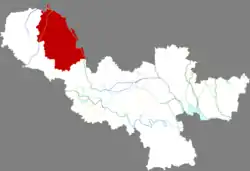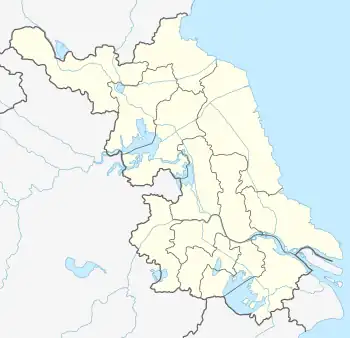Pei County
Pei County, or Peixian (simplified Chinese: 沛县; traditional Chinese: 沛縣; pinyin: Pèi Xiàn), is under the administration of Xuzhou, Jiangsu province, China, bordering the Shandong prefecture-level cities of Jining to the northwest and Zaozhuang to the northeast and sitting on the western shore of Nansi Lake. It has an area of 1,576 square kilometres (608 sq mi) and a population of 1,141,935 in 2010.[1]
Peixian
沛县 | |
|---|---|
 Gefeng Tai (歌风台) | |
 Location in Xuzhou | |
 Peixian Location in Jiangsu | |
| Coordinates: 34°42′58″N 116°55′08″E | |
| Country | People's Republic of China |
| Province | Jiangsu |
| Prefecture-level city | Xuzhou |
| Area | |
| • Total | 1,806 km2 (697 sq mi) |
| Population (2019) | |
| • Total | 1,290,500 |
| • Density | 710/km2 (1,900/sq mi) |
| Time zone | UTC+8 (China Standard) |
| Postal code | 221600 |
| Area code | 0516 |
| Website | www |
History
Pei County was the hometown of Liu Bang, the founding emperor of the Han dynasty. Also, the hometown of Fan Kuai, Liu Bang's oath brother, one of the most well-known lords who helped Liu Bang to overthrow the Qin dynasty and establish the Han dynasty. Fan Kuai's descendants are still living in Pei County now.
Xiaopei (小沛) is an ancient Chinese town located in present-day Pei County. In the late Eastern Han dynasty, it was under the jurisdiction of the Xu Province, which was governed by Tao Qian. Before Tao Qian died, he handed his governorship over to Liu Bei. Liu Bei took refuge in Xiaopei when Lü Bu seized the Xu Province from him through deceit.
Administrative divisions
In the present, Pei County has 15 towns.[2]
- 15 towns
|
|
Climate
| Climate data for Peixian (2009–2020 normals, extremes 1981–2010) | |||||||||||||
|---|---|---|---|---|---|---|---|---|---|---|---|---|---|
| Month | Jan | Feb | Mar | Apr | May | Jun | Jul | Aug | Sep | Oct | Nov | Dec | Year |
| Record high °C (°F) | 16.6 (61.9) |
25.0 (77.0) |
28.7 (83.7) |
33.1 (91.6) |
36.7 (98.1) |
39.0 (102.2) |
39.8 (103.6) |
37.7 (99.9) |
36.1 (97.0) |
35.7 (96.3) |
26.8 (80.2) |
21.2 (70.2) |
39.8 (103.6) |
| Average high °C (°F) | 5.6 (42.1) |
8.8 (47.8) |
15.5 (59.9) |
21.5 (70.7) |
26.9 (80.4) |
31.2 (88.2) |
32.1 (89.8) |
31.2 (88.2) |
27.1 (80.8) |
21.9 (71.4) |
13.9 (57.0) |
7.4 (45.3) |
20.3 (68.5) |
| Daily mean °C (°F) | 0.6 (33.1) |
3.7 (38.7) |
9.8 (49.6) |
15.6 (60.1) |
21.5 (70.7) |
25.9 (78.6) |
27.8 (82.0) |
26.8 (80.2) |
22.2 (72.0) |
16.3 (61.3) |
9.0 (48.2) |
2.3 (36.1) |
15.1 (59.2) |
| Average low °C (°F) | −3.2 (26.2) |
−0.2 (31.6) |
5.0 (41.0) |
10.4 (50.7) |
16.5 (61.7) |
21.3 (70.3) |
24.3 (75.7) |
23.6 (74.5) |
18.5 (65.3) |
11.9 (53.4) |
5.0 (41.0) |
−1.5 (29.3) |
11.0 (51.7) |
| Record low °C (°F) | −13.7 (7.3) |
−15.7 (3.7) |
−7.3 (18.9) |
−1.8 (28.8) |
5.3 (41.5) |
12.6 (54.7) |
17.2 (63.0) |
13.3 (55.9) |
6.9 (44.4) |
−1.4 (29.5) |
−8.3 (17.1) |
−13.7 (7.3) |
−15.7 (3.7) |
| Average precipitation mm (inches) | 14.2 (0.56) |
19.8 (0.78) |
25.8 (1.02) |
39.0 (1.54) |
63.6 (2.50) |
89.0 (3.50) |
199.1 (7.84) |
181.0 (7.13) |
70.2 (2.76) |
32.0 (1.26) |
34.0 (1.34) |
15.4 (0.61) |
783.1 (30.84) |
| Average precipitation days (≥ 0.1 mm) | 4.1 | 4.6 | 5.1 | 6.1 | 7.1 | 7.3 | 11.8 | 11.1 | 7.2 | 5.7 | 5.5 | 4.1 | 79.7 |
| Average snowy days | 3.2 | 2.6 | 0.7 | 0 | 0 | 0 | 0 | 0 | 0 | 0 | 0.8 | 1.4 | 8.7 |
| Average relative humidity (%) | 67 | 64 | 60 | 62 | 65 | 66 | 78 | 80 | 75 | 69 | 70 | 68 | 69 |
| Mean monthly sunshine hours | 124.5 | 131.8 | 179.2 | 202.1 | 215.5 | 186.0 | 168.3 | 171.9 | 167.5 | 161.7 | 136.5 | 127.5 | 1,972.5 |
| Percent possible sunshine | 40 | 42 | 48 | 51 | 50 | 43 | 38 | 42 | 45 | 47 | 45 | 42 | 44 |
| Source: China Meteorological Administration[3][4] | |||||||||||||
References
- 徐州市2010年第六次全国人口普查主要数据公报 (in Chinese). Official website of Chinese Government. Archived from the original on June 6, 2012. Retrieved December 10, 2011.
- "徐州市-行政区划网 www.xzqh.org" (in Chinese). XZQH. Retrieved 2012-05-24.
- 中国气象数据网 – WeatherBk Data (in Simplified Chinese). China Meteorological Administration. Retrieved 25 June 2023.
- 中国气象数据网 (in Simplified Chinese). China Meteorological Administration. Retrieved 25 June 2023.